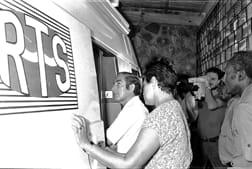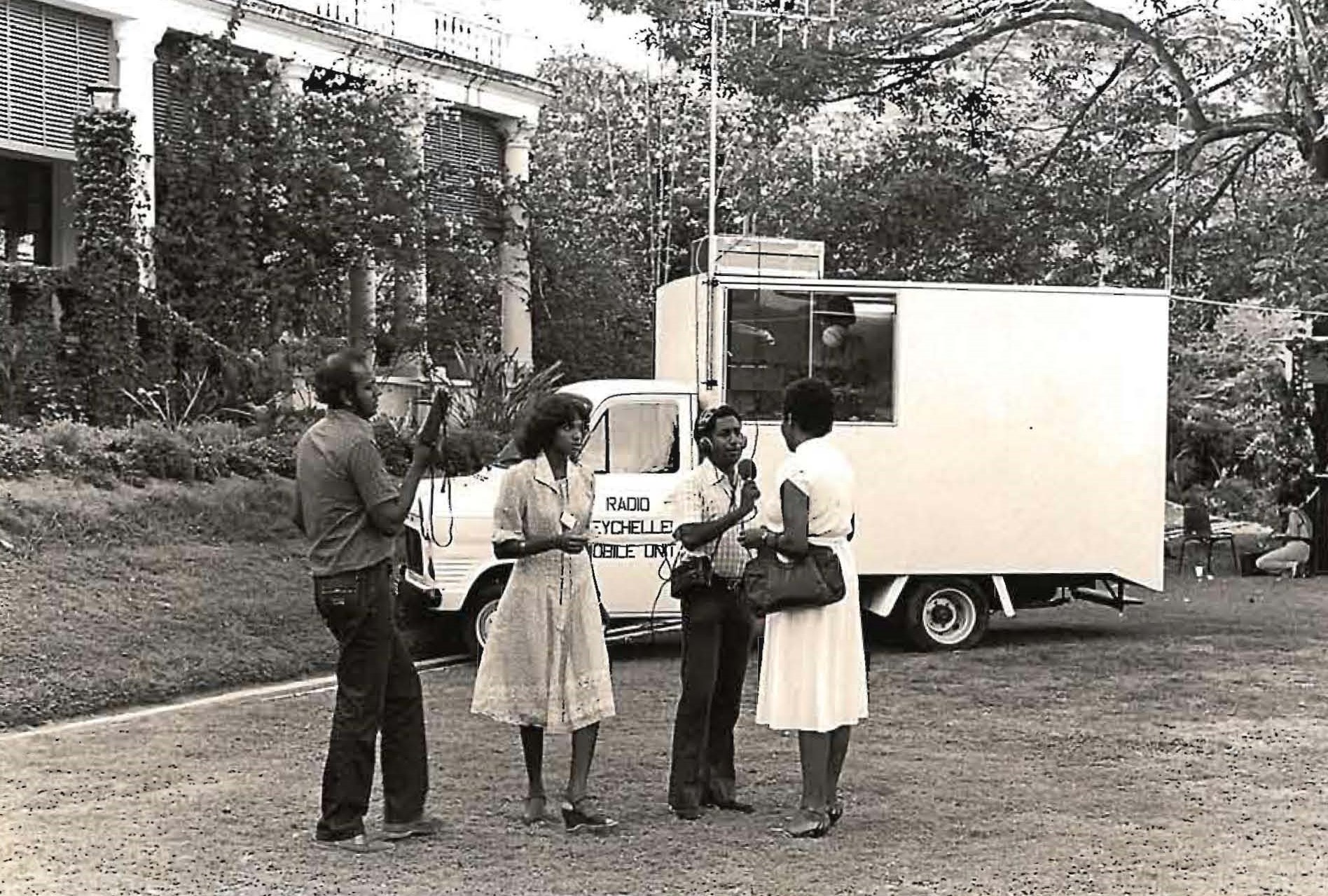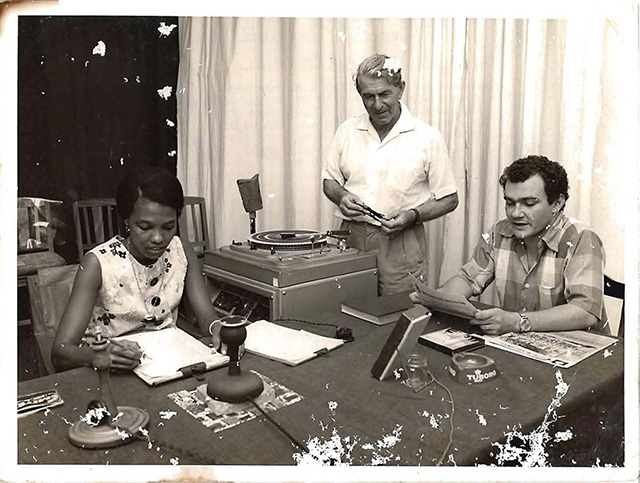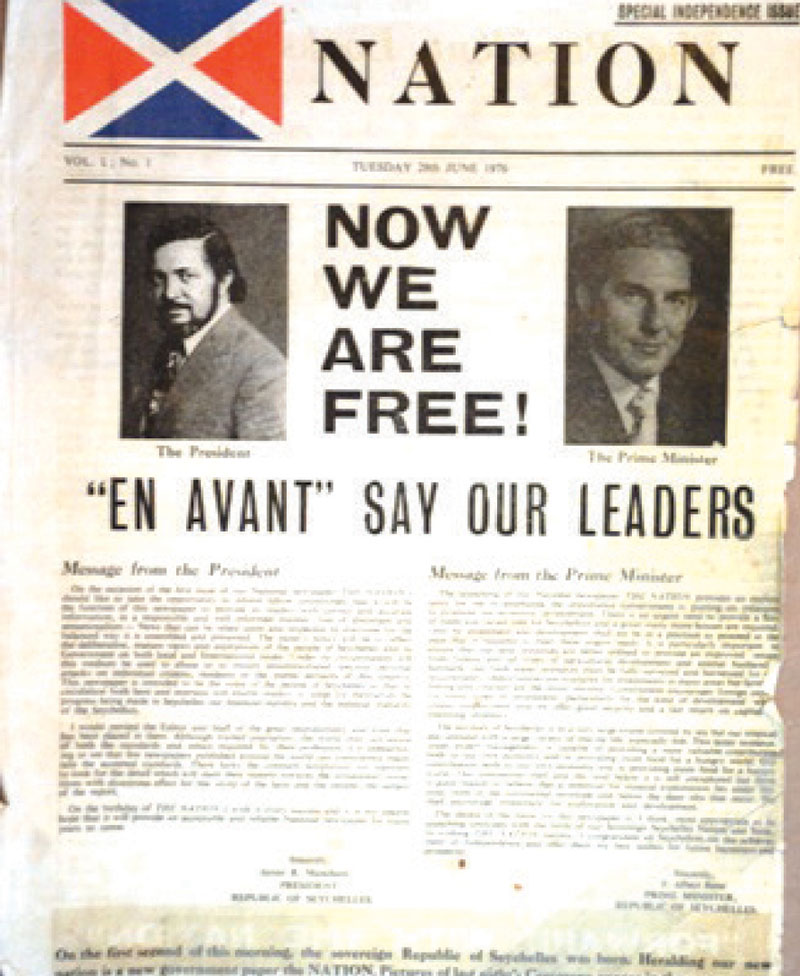Media in Seychelles
The Seychelles country population is 98,000 and currently there are 10 active media outlets - both state owned and private functioning in the country. Over the past three years, four weekly political papers have ceased publication.
Seychelles is ranked 13th in the 2022 Reporter Without Borders' World Press Freedom Index, moving up 39 places compared to 2021. The country has for the past 20 years not had any journalists, media assistants or citizen journalists killed or imprisoned.
There are four publications comprising of two dailies, two weeklies and others that are published fortnightly, monthly, quarterly and bi-annually. The State owns one of the daily newspapers, Seychelles Nation and a private publisher is the proprietor of Today in Seychelles. One of the weekly newspapers, The People is owned by the opposition party, Parti Lepep (The People's Party). There is only one other other weekly, namely The Independent which is closely linked to the Seychelles Labour Union.
The Seychelles News Agency which was launched on the 22nd of April 2014, operates on an online platform and provides national news for a global audience. Le Seychellois Hebdo has ceased physical publication but operates through its Facebook page.
The publicly funded Seychelles Broadcasting Corporation operates three television channels (SBC 1; SBC 2; SBC 3) and two radio channels, namely Radyo Sesel, broadcasting on medium wave (AM) and Paradise FM which broadcast on frequency modulation (FM). The television and Radyo Sesel radio services offer a variety of news, public information and entertainment programmes whilst the FM channel focuses more on music programmes.
TéléSesel is the country’s sole private television channel accessible on Cable & Wireless Television Cable TV. The local channel was launched in July of 2017. It gives attenton to local news, information and entertainment programmes.
The country currently has two private radio stations. Pure907 (previosuly Pure FM) began its operations in August 2012 and broadcasts music programmes and advertisements. K-Radio began its operations in January 2018. Both stations broadcast music programmes, sports news and entertainment as well as advertisements.
There has been a significant increase in the use of social media due to improved internet connectivity and penetration following the installation of the undersea optic-fibre cable that connects the main island of Mahé to the rest of the world. The polarisation of the media has encouraged the use of social media for political discourse and as a source of information.
An increase in media outlets has surpassed the national capacity of qualified practicing journalists. Some media houses have their own in-house training programme for working journalists and new recruits. However, aspiring journalists who are suitably qualified are awarded scholarships by the government for further education at tertiary level. Media practitioners also participate in various workshops or short term training that are held either locally or abroad.
The Right to Freedom of Expression is provided for in Article 22(1) under the Seychellois Charter of Fundamental Human Rights and Freedoms in the Constitution of Seychelles. The conduct of the media is guided by the Seychelles Media Commission Code of Conduct, which was put in place following consultations with the industry and in line with Section 13(2) (c) of the Seychelles Media Commission Act 2010.
The media is free to publish and broadcast content that comply with guidelines, set out in the SMC Code of Conduct, the Constitution and other legal obligations that are in force in Seychelles, in respect of media freedom and expression.
Milestone of Broadcast Media in Seychelles
2019
Pure Fm was acquired by Today in Seychelles and changes its name to Pure907 Seychelles.
28th June
2018
SBC goes digital with 10 TV channels (only three currently in use) and 4 radio channels. Three of the channels provide local content.
2018
The iconic Radio Station at Union Vale that once house RTS and SBC radio stations is demolished for the construction of the New SBC House.
July 2017
K-Radio is launched, it the second private radio station in the Seychelles. It is a subsidiary company of Kreol Entertainment. It is a youth driven radio with a targeted audience of 19 to 34 years of age. It uses a more laid back and informal tone to address its targeted audience. K-Radio is an entertainment station both in the delivery of its content and types of music played, it is owned by Aubrey Philo and Travis Julienne.
2017
The SBC Act is amended and a new Board of Directors, new CEO and Deputy CEO was appointed.
2017
Telesesel is launched. It is the first private televised channel in Seychelles. The channel is accessible only on Cable and Wireless IPTV Platform channel. It is managed by Radius Studio in collaboration with Cable and Wireless. It is the first of its kind to produce HD quality programmes which aims to educate, inform and entertain Seychellois audience. Telesesel is run by Clive Camille and Gilmer Philoe.
2013
PureFm started broadcasting in August 2013. It was the first private commercial radio station to hit the airwaves featuring music, news, magazine styled programmes, entertainment and sports contents. The station played a large selection of 90s and 80s classic hits, some local music and also hit music from different eras. PureFM also uses live internet streaming via its website to reach listeners around the globe. The radio station's owner is Maldivian Ahmed Mahir Didi.
2012
In 2012 the Seychelles regulations were amended to allow for radio and TV licences to become more affordable. A yearlong national radio licence costs R100,000 per year or, R8,333 a month.
2011
The SBC Act 2011 establishes the corporation as an independent body corporate administered by a board of directors, appointed by the President of the Republic.
2010
SBC television started providing a 24 hour service thanks to its Automated On-Air Playout system.
30th May
1997
Paradise FM radio was launched as a complementary of the AM radio.
30th May
1st May
1992
RTS became the Seychelles Broadcasting Corporation (SBC), a public broadcasting service.
1989
RTS television started broadcasting for the whole week, but only in the evenings.
1st January
1983

Public television was launched with Radio Television Seychelles (RTS) broadcasting from Hermitage on weekends from Friday to Sunday. RTS was run by the Ministry of Information as a Government station.
1980
A television unit was set up at Bel-Eau to produce video progammes for the Ministry of Education.
1977

The radio received its first outside broadcast van making broadcast possible from various places around Mahé and the hours of broadcasting extended to 65 hours per week.
30th May
1971
There was an explosion at the radio station at Union Vale which totally destroyed the transmitters.
30th May
1966
The radio broadcasting time increased from one hour to four and a half hours weekly and broadcast was done in all three languages French, English and Creole.
1965

Radio Seychelles first came on the air from a studio at Union Vale.
1945
The Department of Education ran a one-hour broadcast daily using the fascilities of the Cable & Wireless Telecommunications Company.
1943
On the 14th of June 1943 the Seychelles witnessed its first radio broadcast. Governor W.M Logan Esq, addressed a parade on Gordon Square through the Eastern Telegraph's "Colset" TFS12 transmitter.
Milestone of Printing Press in Seychelles
08 Feb 2013
2020
In July, "One Seychelles" organised its first convention and launched Zilwa, the newspaper that was to replace The Islander Weekly. Zilwa became the party newspaper until it ceased to be published in October 2020.
08 Feb 2013
2019
The Islander Weekly, a political newspaper was published in August of 2019 and simultaneously had a online version. Its editor was Mr. Herve Anthony. The paper was linked to the political party, One Seychelles. It ceased to be published in October of 2019.
2016
On the 1st of June a newer version of the weekday Seychelles Nation was published with a bigger and easy-to-read style.
April 2014
Seychelles News Agency (E-media) is launched. It is funded by the Government of Seychelles. The digital media platform features articles written with a global audience in mind and it aims at creating awareness of the Seychelles and its people in the global community.
2014
The Independent newspaper is published by the Au Cap Publication Company, with its editor being Mr. Ralph Volcere, a familiar face in the political scene of Seychelles. The motto of the paper dictates its editorial line, ‘obligation to the people of Seychelles takes precedence over loyalty to an individual’, claiming to give independent reports in political, economic, business, legal, miscellaneous and international affairs to its readers.
2012
The first weekday’s coloured Seychelles Nation newspaper was published on the 5th of November.
September
2011
Les Seychellois Hebdo Newspaper was launched. It was owned by editors, Gervais Henrie & Lindy Vital. The weekly newspaper aligned itself with the opposition party, Seychelles National Party (SNP), with contributions made by the party leader. Le Seychellois Hebdo stopped publication during the last quarter of 2019, and has been posting articles on its Facebook page.
September
1st March
2011
Today Newspaper, the first daily independent coloured newspaper. The paper is designed to cater for both national and international readers. The agency provides an independent and objective perspective without favouring any one section of the population over the other. Today newspaper has ceased to publish in paper form, and has gone digital. Subscribers have access to their daily copies online.
2011
The Seychelles Nation increased its number of Pages from 12 to 20 on the 5th of January.
2010
The National Information Service Agency (NISA) took over the management and running of the Seychelles Nation.

2010
The National Assembly approved legislation for the setting up of the Information Services.
1995
The 1st colour edition of the Seychelles Weekend Nation was printed.
1994
The Seychelles Nation moved to its new home at Laurier Road at Victoria on the 12th of March, with its new home it also acquired new state of the arts technology. By then the Seychelles Nation also published a weekend edition of 24 pages named the Seychelles Weekend Nation.
1993
L’echo Des Iles –Newspaper owned by the Roman Catholic Diocese, start publishing twice monthly, with 2100 copies circulated.
1992
REGAR newspaper however it ceased publication in 2010
1990
Four more pages was added to the Seychelles Nation’s weekend edition to make it 20 pages.
1982
The weekday edition of Seychelles Nation had increased its number of pages to 10 and weekends to 16 pages.
1984
On the 4th of January of that year, the Nation changed its name to Seychelles Nation.
1979
On the 19th November, the Seychelles Nation published its morning edition. It published from Monday to Fridays with 8 pages and on Saturdays the Seychelles Nation had 12 pages.
1978
Following the coup in 1977, a special unit called the "Government Press Communique Services" was established within the new Government.
1977
On the 25th of June, an independent weekly newspaper was launched under the name Weekend Life. Its owner was Mr Bernard Verlaque and its editor Mr. Gilbert Pool, a Seychellois journalist who had been practicing in the UK. Its publisher at the time was Mr Serge Pool. Its last publication was in 1979.
1976
On the 29th June as part of the Independence Day celebrations, the Seychelles Bulletin became Nation. By then it was publishing six pages and it was an evening edition.

1964
People, a weekly cyclostyled pamphlet issued by the Seychelles Peoples United Party who claim a readership of 800. Publication suspended in 1977.
1963
Le Seychellois a privately owned newspaper which contains vibrant comments on local affairs and advertising matters. It initially published only twice a week however it became a daily newspaper, and circulating 1500 copies daily. Its editor was Mr. Gustave Decommarmond.
1963
Seychelles Weekly newspaper is first published and it is the mouthpiece of the Democratic Party. Its circulation is at 2000 copies.
1961
The publication again changed its name to become the Seychelles Bulletin. The bulletin published mostly government advertising, copra and cinnamon prices, also some international news transcript from the BBC radio.
1942
The Reuters’ Telegrams and Advertisers changed its name to Government Bulletin. Around 800 copies are circulated daily.
1935
The Catholic Church began publishing a monthly newspaper under the name “Action Catholic.”
1926-1929
The Government started publishing a daily leaflet called Reuters’ Telegrams and Advertisers.
